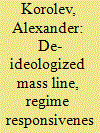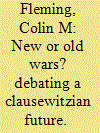| Srl | Item |
| 1 |
ID:
153566


|
|
|
|
|
| Summary/Abstract |
Once the primary method of revolutionary leadership, the “mass line”
has reemerged in today’s China as a method of public policy making.
Th is study explores and theorizes the implications of mass-line tactics
in policy making and state-society relations in contemporary China. At
the theoretical level, it argues that the de-ideologized mass line in
combination with traditional forms of nonmobilized participation can
enhance government responsiveness to the broader public interest. Th e
mass line can complement traditional forms of voluntary participation
in that it can allow better representation of social groups who regularly
fail to articulate their needs through the existing participation mechanisms
and who therefore remain outside of the policy-making process.
Empirically, the paper draws on existing Chinese studies, official
document analysis, and unstructured interviews with Chinese
academics to provide examples for the theoretical argument. Th is study
analyzes the workings of the mass-line tactics in China during the New
Healthcare Reform and the formation of the 12th Five-Year Plan. If
implemented not as a propaganda tool but as a mechanism of interest
articulation and aggregation, the mass line has the potential to off er
China alternative routes of democratization.
|
|
|
|
|
|
|
|
|
|
|
|
|
|
|
|
| 2 |
ID:
169332


|
|
|
|
|
| Summary/Abstract |
As it has accrued meaning over time, outer space has become as much a social construct as a physical reality. Because space is a product of the imagination, its contours are not stable and are subject to needs and desires that shift and evolve according to social, political, and economic priorities. This article examines differing relationships to space that shed light on the social and political dynamics that defined their historical moments—in particular the different iterations of the democratic impulse that these relationships express. This article compares the emergence of the dualistic and nation-based discourse of the late 1950s and 1960s Cold War era out of the first satellite and rocket launches to present-day ‘NewSpace,’ which is characterized by free enterprise and the logic of commodification. In the process, it touches on the 1986 by the Challenger mission and the emblematic figure of school teacher Christa McAuliffe; however, attention is paid primarily to how she represented a transitional moment between the global, nation-building priorities of the Cold War and the contemporary profit-driven individualism of NewSpace. The article concentrates on Cold War spaceflight and contemporary space tourism because they offer in the most vivid way a glimpse into how society's own projections have populated the universe.
|
|
|
|
|
|
|
|
|
|
|
|
|
|
|
|
| 3 |
ID:
087822


|
|
|
|
|
| Publication |
2009.
|
| Summary/Abstract |
Over the last 18 years or so, much of the debate about modern warfare has been about whether it should be described as 'old' or 'new'. However, there has not been a definitive answer as to which best reflects war in the modern world. Increasingly, the alternative arguments are polarised into opposing camps. Indeed, it would be fair to say that there is little in the way of debate at all. By revaluating the strengths and weaknesses of each argument, this paper aims to reinvigorate that discussion by examining whether changes in the way we understand war are really required. Finding that the ideas are not in fact mutually exclusive, it suggests that future research could benefit from a combined approach.
|
|
|
|
|
|
|
|
|
|
|
|
|
|
|
|